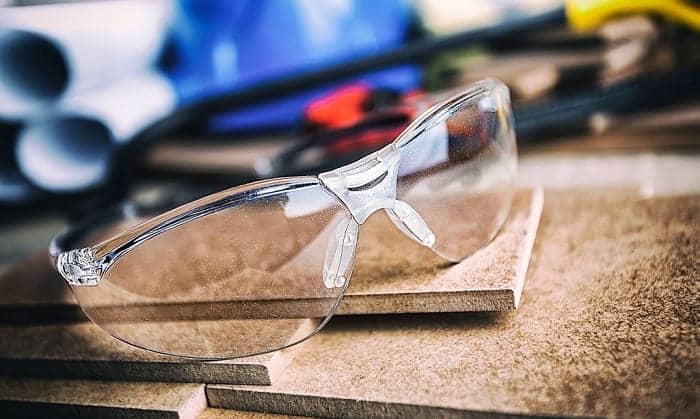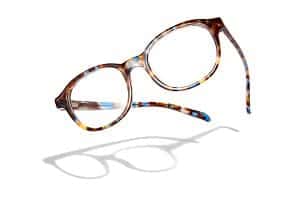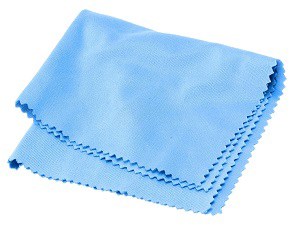In a world full of screens and extreme UV, glasses are inseparable for many of us, myself included, I can not leave aside my prescription glasses or sunglasses. I have to admit, they are lifesavers. However, they also cause inconvenience quite often, especially the marks they leave on my nose. How about you? Do you find glasses marks annoying?
Because of that, I have made further research on how to prevent glasses marks on nose and am extremely excited to share the information with you today. In short, there are six steps to prevent glasses marks.
Table of Contents
What You Will Need
Wearing a pair of glasses might not be that difficult, but wearing them in a way that looks sophisticated while feeling confident and comfortable might take some extra effort. Quickly gather the following:
Glasses
May it be your everyday prescription glasses or your favorite pair of sunglasses that keep leaving marks on your nose, fear not, I’ve got your back. Pick a pair to meet your need but make sure they also satisfy the following standards:
- Prescription glasses: These are glasses designed to improve your vision. If you already own an ideal pair, that’s great news. However, if you have any ill experience with your current ones, such as eye watering, irritation, or fatigue after a few hours of use, have your eyesight re-examined and purchase a new pair of glasses.
- Sunglasses: As suggested in the name, these are used to protect our eyes from the sun. Sunglasses can make a huge fashion statement when you have the right pair. They should come with frames that compliment your face shape, fit your personal style, and are the right size for your eyes. But most importantly, ensure that your lenses block 99% to 100% of UVA and UVB rays, like UV 400-protected sunglasses.
Eyeglasses cleaning cloth
No piece of cloth is suitable to clean your glasses. A material that feels soft doesn’t mean it is safe for your lenses. In fact, very few types of cloth are good enough to clean eyewear. Your best bet in this scenario is a clean piece of microfiber cloth. It keeps any cleaning process effective and damage-free.
6 Simple Steps to Prevent Glasses Marks on Nose
The glasses mark on your nose might be extremely annoying, but don’t worry, they won’t stick around for any longer. The following part will give you very detailed steps to prevent nose dents from glasses:
Step 1: Measure your ideal glasses’ width
You should stand in front of a mirror, hold a ruler, and measure the distance from your left temple to your right temple. You should get the total frame width of your wanted glasses. When choosing a pair of glasses, make sure the frames’ width is not wider or narrower than the measurement.
Step 2: Measure your ideal glasses’ bridge
You will need to look straight in the mirror, see where your nose bridge starts and estimate if it is above or under your pupils’ level.
If your bridge is below or at the level of your pupils, you have a low bridge size, which is approximately from 16mm to 18mm. If your bridge is above your pupils’ level, your bridge size will be large, which is approximately from 19mm to 21mm. Keep these numbers in mind when you purchase glasses online or from a store.
Step 3: Choose the right frames
Choose the frames with a top that is lower than your eyebrows’ line. The frames’ lower edge should never be pressed against your cheeks because they can cause irritation.
Besides that, your frames should not be too light-weighted, too heavy-weighted, too small, or too bulky. The glasses can easily slide down your face or fall out of your face when they are too light. If the frames are too large or too heavy, it can leave marks on your nose.
Before we move to step number 4, if you choose to stick with your current glasses instead of buying new ones, please make sure the glasses’ width, bridge, and frames meet the standards above.
Step 4: Clean the glasses
Now that we all have a pair of glasses, either newly purchased or already used, we can give them a thorough clean.
The mark on your nose from glasses can come from accumulated oil, sweat, makeup, or dust. Use the piece of microfiber cloth we’ve prepared and gently clean your glasses. Thoroughly wipe not only the lenses, but also the frames. If necessary, use any eyewear cleaning solution you have.
Step 5: Make adjustments
Now, all there is left to do is to slightly adjust your pair of glasses to ensure that the glasses sit properly on your nose. If you have plastic frames, blow-dry the frames; with a little heat, the plastic frames would be easy to adjust.
Otherwise, go ahead and hold each pad individually, bend it gently with your hand until they’re as loose or tight as wanted. They should fit the size of your nose bridge. Be very gentle and careful since you might break your glasses. Also, if needed, seek help from an optometrist.
Step 6: Try it on
Here comes the big moment. After all of the measurements and adjustments, we can finally enjoy our perfect pair of glasses. Try wearing it while carrying out daily tasks and see if there are any glasses marks on your nose or whether the glasses hurt your nose bridge. If you follow each step above with care, there should be no problems left.
Conclusion
Did you have fun following the tutorial on how to prevent glasses marks on nose? Glasses digging into the nose might cause inconvenience and discomfort. Therefore, emphasize each step and enjoy your eyewear. At the end of the day, protecting our eyes and being comfortable in our own skin are what matter the most.
I really appreciate your attention. I hope you found this article helpful, and if you do, don’t hesitate to share it to the people around you so that those in need can get the necessary help. Also, don’t forget to share your thoughts in the comment section. I look forward to hearing from you!

Having worked in the field of personal protective equipment for over two decades, Andrew Carnegie is a specialist in the field.
At EDC, he strives to improve performance efficiency and promote workplace safety for EDC’s readers and customers. He also researches the most up-to-date equipment that has earned relevant accreditation for use in a wide range of industries and specialties.






